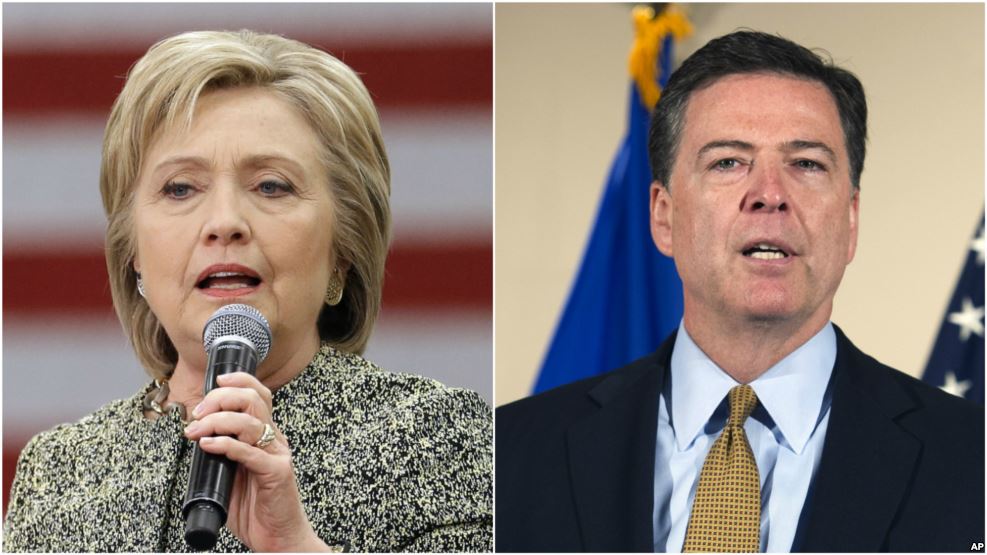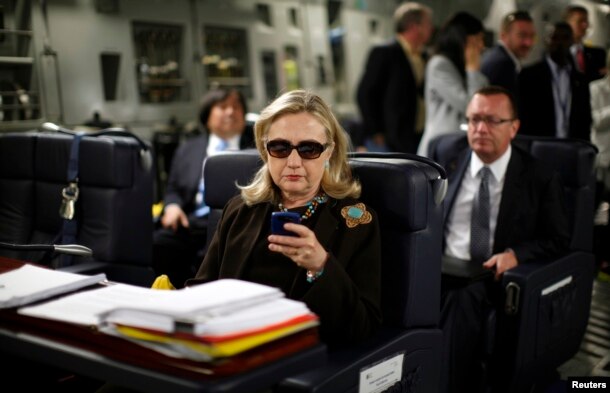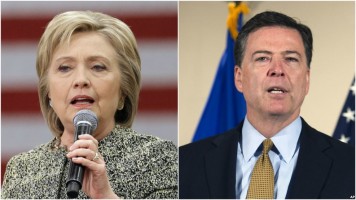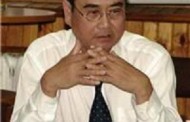 Giám đốc FBI James Comey (phải) đề nghị không truy tố bà Hillary Clinton (trái) về việc dùng máy chủ tư và nhiều điện thoại di động để chuyển email cá nhân và công vụ trong thời gian bà làm ngoại trưởng.
Giám đốc FBI James Comey (phải) đề nghị không truy tố bà Hillary Clinton (trái) về việc dùng máy chủ tư và nhiều điện thoại di động để chuyển email cá nhân và công vụ trong thời gian bà làm ngoại trưởng.
Giám đốc FBI James Comey nói sau một cuộc điều tra kỹ càng về việc bà Hillary Clinton sử dụng máy chủ email cá nhân trong khi giữ chức vụ ngoại trưởng, ông không thể đề nghị truy tố bà Clinton. Theo tường thuật của thông tín viên Ken Bredemeier của đài VOA, quyết định đó đã gặp phải sự chỉ trích của nhiều người, nhất là những người về phe Cộng hòa.
Ông Comey nói cuộc điều tra phát giác bà Clinton và các nhân viên của bà đã không cẩn thận đối với những thông tin mật và có chứng cứ là có thể có những sự vi phạm.
Ông Comey nói bà Clinton đã dùng một vài máy chủ và nhiều điện thoại di động để chuyển những email cá nhân và email dành cho công vụ. Trong cuộc điều tra này, FBI đã đọc toàn bộ 30.000 email của bà Clinton.
Ông Comey cho biết trong số 52 chuỗi email có 110 email được xác định là có chứa đựng thông tin mật vào thời điểm email được gởi đi, một số là tuyệt mật, nhưng ông không tìm thấy bằng chứng bà Clinton cố ý vi phạm:
“Các công tố viên cần cân nhắc một số những yếu tố trước khi quyết định có truy tố hay không. Có những việc cần phải xem xét kỹ lưỡng, như bằng chứng rõ ràng, đặc biệt là về ý định. Những quyết định có tinh thần trách nhiệm cũng cần được xem xét trong bối cảnh của những hành động cá nhân và những tình huống tương tự đã được xử trí như thế nào trong quá khứ. Khi nhìn lại những cuộc điều tra của chúng tôi về việc xử lý không đúng cách hay loại bỏ những thông tin mật, chúng tôi không tìm thấy một trường hợp nào có thể truy tố hình sự dựa trên những sự kiện này”.
Ông Comey nói thêm rằng có thể có những kẻ thù đã xâm nhập vào tài khoản email của bà Clinton. Ông cho biết bà Clinton đã sử dụng “rất nhiều” những máy chủ tư tại những nước khác.
Bà Clinton giải thích rằng bà sử dụng tài khoản email trên một máy chủ cá nhân thay vì tài khoản email chính thức của bà vì bà muốn đảm bảo là thư từ riêng tư của bà được bảo vệ.

Ngoại trưởng Hillary Clinton kiểm tra email trên điện thoại trước khi khởi hành trong chuyến công du đến Tripoli, Libya, ngày 18/10/2011.
Các nhà phân tích bên ngoài cho rằng sử dụng một máy chủ như vậy ít bảo đảm hơn là dùng một máy chủ do chính phủ cung cấp.
Tuyên bố của Giám đốc FBI James Comey được đưa ra một tuần sau khi có những tranh cãi chính trị về việc chồng bà Clinton là cựu Tổng thống Bill Clinton gặp Bộ trưởng Tư pháp Loretta Lynch tại phi trường Phoenix, tiểu bang Arizona. Cả ông Bill Clinton lẫn bà Lynch nói hai người nói chuyện với nhau khoảng nửa tiếng đồng hồ, không phải về vấn đề email của bà Clinton, nhưng cả hai đều hối tiếc về việc này vì bà Lynch là người giám sát cuộc điều tra về vụ email.
Các đảng viên Cộng hòa lẫn Dân chủ đều chỉ trích bà Lynch đã gặp ông Clinton tại phi trường Phoenix.
Tiếp sau lời loan báo của Giám đốc FBI, phát ngôn viên của bà Clinton nói là toàn bộ ban vận động tranh cử của bà Clinton rất hài lòng về việc FBI không đề nghị truy tố bà Clinton.
Tuy nhiên trong một cuộc vận động tranh cử tại tiểu bang North Carolina, ông Donald Trump, người xem như được đảng Cộng hòa đề cử làm ứng cử viên tổng thống, gọi kết luận của FBI là “đáng xấu hổ”.
Ông Trump nói: “Tôi không biết bạn nghĩ như thế nào nhưng tôi luôn luôn cảm thấy bà Clinton sẽ thoát khỏi việc truy tố hình sự vì cách hành xử nguy hiểm và bất hợp pháp của bà, bởi vì tôi luôn luôn biết và thấy việc này và điều này thật đáng buồn vì hệ thống của chúng ta thực sự bị gian lận, hoàn toàn gian lận và hư hỏng”.
Chủ tịch Hạ viện Paul Ryant nói kết luận của ông James Comey không thể giải thích được. “Từ chối truy tố cựu Ngoại trưởng Hillary Clinton vì xử lý không đúng đắn những thông tin về an ninh quốc gia và chuyển những thông tin này sẽ tạo thành một tiền lệ nguy hiểm”.
Các cuộc thăm dò cho thấy bà Clinton hơn ông Trump 5% điểm vào 4 tháng trước cuộc bầu cử ngày 8 tháng 11 năm nay để chọn người thay thế Tổng thống Barack Obama, người sẽ rời khỏi nhiệm sở vào tháng 1 sang năm. Các cuộc thăm dò thường có sai số là 3%.
VOA Tiếng Việt
Hillary Clinton’s email problems might be even worse than we thought
By Chris Cillizza
July 5
Here’s the good news for Hillary Clinton: The FBI has recommended that no charges be brought following its investigation of the former secretary of state’s private email server.
Here’s the bad news: Just about everything else.
FBI Director James B. Comey dismantled large portions of Clinton’s long-told story about her private server and what she sent or received on it during a stirring 15-minute news conference, after which he took no questions. While Comey exonerated Clinton, legally speaking, he provided huge amounts of fodder that could badly hamstring her in the court of public opinion.
Most importantly, Comey said the FBI found 110 emails on Clinton’s server that were classified at the time they were sent or received. That stands in direct contradiction to Clinton’s repeated insistence she never sent or received any classified emails. And it even stands in contrast to her amended statement that she never knowingly sent or received any classified information.
Comey condemned Clinton and her top aides as “extremely careless” in how they handled classified information during her time as the head of the State Department, adding: “Any reasonable person … should have known that an unclassified system was no place” for that sort of information.
There was more — much more. Comey said Clinton had used not one but multiple private email servers during her time at State. He said Clinton used multiple email devices during that time. (She had offered her desire to use a single device for “convenience” as the main reason she set up the private server.) He noted that the lawyers tasked by Clinton with sorting her private emails from her professional ones never actually read all of the emails (as the FBI did in the course of its investigation). Comey said that while the FBI found no evidence that Clinton’s private server was hacked by foreign governments, it was possible that it had been. He argued that the Clinton lawyers had deleted emails they marked as personal that contained professional content, and that while the FBI found some of those emails in its investigation, it was certainly possible more existed that they were unable to track down.
It’s worth remembering at this point that Clinton and her team deleted more emails than they turned over to the State Department.
It’s hard to read Comey’s statement as anything other than a wholesale rebuke of the story Clinton and her campaign team have been telling ever since the existence of her private email server came to light in spring 2015. She did send and receive classified emails. The setup did leave her — and the classified information on the server — subject to a possible foreign hack. She and her team did delete emails as personal that contained professional information.
Those are facts, facts delivered by the Justice Department of a Democratic administration. And those facts run absolutely counter to the narrative put forth by the Clinton operation: that this whole thing was a Republican witch-hunt pushed by a bored and adversarial media.
Now for the key question: How much do the FBI findings hurt her campaign?
Clinton did avoid indictment, a ruling that would have effectively ended her campaign or left it so badly weakened that there would have been a major move within Democratic circles to replace her as the nominee.
That said, campaigns aren’t governed by the ultimate legality of what Clinton did or didn’t do. So, while dodging an indictment is a good thing — she isn’t under criminal investigation and remains a candidate — it’s a far different thing from being cleared (or even close to it) in the court of public opinion.
For a candidate already badly struggling on questions of whether she is honest and trustworthy enough to hold the office to which she aspires, Comey’s comments are devastating. Watching them, I could close my eyes and imagine them spliced into a bevy of 30-second ads — all of which end with the FBI director rebuking Clinton as “extremely careless.”
Those are facts, facts delivered by the Justice Department of a Democratic administration. And those facts run absolutely counter to the narrative put forth by the Clinton operation: that this whole thing was a Republican witch-hunt pushed by a bored and adversarial media.
Now for the key question: How much do the FBI findings hurt her campaign?
Clinton did avoid indictment, a ruling that would have effectively ended her campaign or left it so badly weakened that there would have been a major move within Democratic circles to replace her as the nominee.
That said, campaigns aren’t governed by the ultimate legality of what Clinton did or didn’t do. So, while dodging an indictment is a good thing — she isn’t under criminal investigation and remains a candidate — it’s a far different thing from being cleared (or even close to it) in the court of public opinion.
For a candidate already badly struggling on questions of whether she is honest and trustworthy enough to hold the office to which she aspires, Comey’s comments are devastating. Watching them, I could close my eyes and imagine them spliced into a bevy of 30-second ads — all of which end with the FBI director rebuking Clinton as “extremely careless.”
Still, all things considered, this is a very bad day for the Clinton campaign. It’s not the worst outcome (indictment), but it badly disrupts her attempts to move beyond the email server story as she seeks to unite the party in advance of the Democratic convention later this month. And it suggests the email issue will haunt her all the way through Election Day on Nov. 8.
APNewsBreak: State Department reopens Hillary Clinton emails investigation
Although Clinton’s closest confidants have left the State Department, they could still face punishment. The most serious is the loss of security clearances, which could complicate her aides’ hopes of securing top positions on her national security team if she becomes president.
WASHINGTON (AP) — The State Department is reopening an internal investigation of possible mishandling of classified information by Hillary Clinton and top aides, officials told The Associated Press on Thursday.
Although the former secretary of state’s closest confidants have left the agency, they could still face punishment. The most serious is the loss of security clearances, which could complicate her aides’ hopes of securing top positions on her national security team if she becomes president.
The State Department started its review in January after declaring 22 emails from Clinton’s private server to be “top secret.” It was suspended in April so as not to interfere with the FBI’s inquiry. State Department spokesman John Kirby said the probe is restarting after the Justice Department’s announcement Wednesday that it won’t bring any criminal charges.
“We will aim to be as expeditious as possible, but we will not put artificial deadlines on the process,” Kirby said. “Our goal will be to be as transparent as possible about our results, while complying with our various legal obligations.”
Kirby wouldn’t say anything more about the precise information officials are evaluating. But when the probe was launched almost six months ago, officials said it pertained particularly to a set of emails that were upgraded to one of the nation’s highest classification levels. One question they said they were investigating was whether any of the emails were classified at the time of transmission.
Additionally Thursday, Republican lawmakers said they would now ask the FBI to investigate whether Clinton lied to the committee. That announcement came in a testy hearing with FBI Director James Comey, who defended the government’s decision not to prosecute Clinton over her private email setup.
Clinton was secretary of state until early 2013. Most of her top advisers left shortly thereafter.
But Kirby said this week former officials can still face punishment. Options range from counseling and warnings to the revocation of an individual’s security clearance.
Beyond the Democratic front-runner, the probe is will most likely examine confidants Cheryl Mills, Jake Sullivan and Huma Abedin — who wrote many of the emails to their boss that the various investigations have focused on. Mills, Clinton’s chief of staff at the State Department, has been viewed as a possibility for the same job in the White House. There is speculation that Sullivan, Clinton’s former policy chief, could be national security adviser.
“There could be repercussions,” Kirby told reporters Wednesday, saying infractions identified would be kept on file. If someone’s security clearance is taken away, he said it would have an effect “assuming that individual still needed the clearance to work in another federal agency or something like that.”
The State Department says it won’t identify former officials that still hold security clearances. But in an email Fox News made public earlier this year, the department described Mills as still holding a valid clearance.
July 7, 2016 at 4:56 pm
BRADLEY KLAPPER
The Associated Press














































